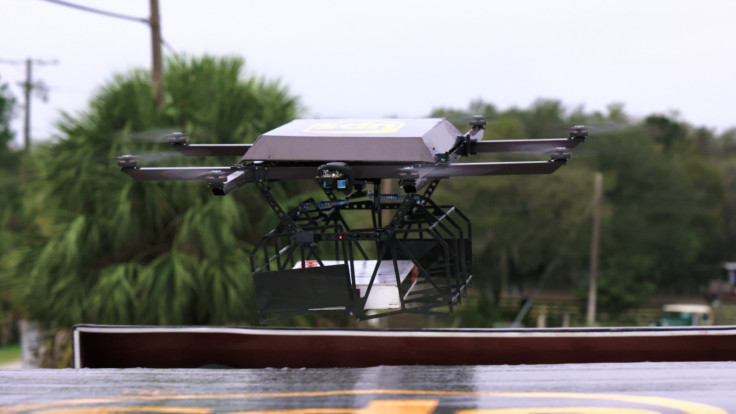Watch out Amazon: UPS shows off delivery drones of its own
Drones take off from UPS vans to make deliveries while the driver heads to the next address.
Amazon's futuristic vision of drone squadrons filling the skies and delivering packages all over the country are a little wide of the mark, according to courier company UPS.
Instead of launching drones at the distribution centre then flying them to customers' homes and back, UPS is testing a system whereby a drone sits on the roof of a delivery van and acts as a second pair of hands for the driver.
While the van heads up the long driveway to one house, the drone takes off with a package for the next property, dropping it off in their garden and return to the van. UPS claims that replacing just one van-driven mile per day globally with drone flights would save the company up to $50m (£40m) a year.
A video uploaded to YouTube on 21 February shows how the system has been successfully tested. UPS claims the low-altitude drone flights comply with all current regulation. The use of drones will reduce miles driven by vans, lowering emissions and possibly even shortening delivery times if the autonomous drone can fly quickly enough to not keep the driver waiting.
Mark Wallace, UPS senior vice president of global engineering and sustainability, said: "This test is different than anything we've done with drones before. It has implications for future deliveries, especially in rural locations where our package cars often have to travel miles to make a single delivery."

Wallace adds: "Imagine a triangular delivery route where the stops are miles apart by road. Sending a drone from a package car to make just one of those delivers can reduce costly miles driven. This is a big step toward bolstering efficiency in our network and reducing our emissions at the same time."
But UPS insists that drones will not take drivers' jobs. Wallace added: "Drivers are the face of our company, and that won't change. What's exciting is the potential for drones to aid drivers at various points along their routes, helping them save time".
The eight-rotor drones can carry packages weighing up to 10 pounds (4.5kg) and can fly for up to 30 minutes at a time. The driver parks, climbs into the back of the truck and fits a package to the drone. They then tap a touchscreen control unit and the drone takes off and flies away, autonomously making the delivery and returning to the van to recharge. The drone can return to the van even if it has driven to a new location.
The drones are produced by a firm called called Workhorse, whose founder and CEO Stephen Burns said: "It's wonderful to see this technology applied in such a practical way. The drone is fully autonomous. It doesn't require a pilot. So the delivery driver is free to make other deliveries while the drone is away."
© Copyright IBTimes 2024. All rights reserved.






